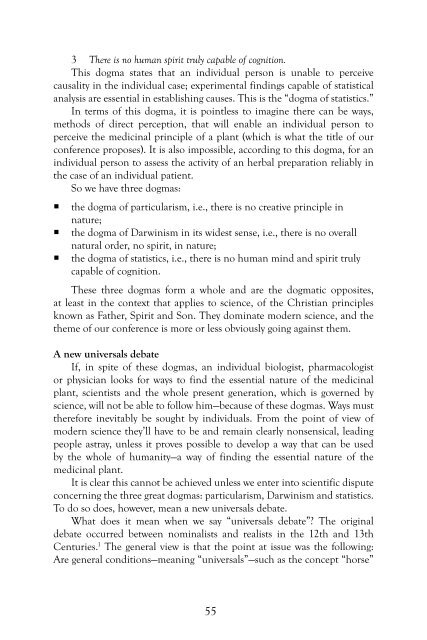When Healing Becomes Educating, Vol. 1 - Waldorf Research Institute
When Healing Becomes Educating, Vol. 1 - Waldorf Research Institute
When Healing Becomes Educating, Vol. 1 - Waldorf Research Institute
You also want an ePaper? Increase the reach of your titles
YUMPU automatically turns print PDFs into web optimized ePapers that Google loves.
3 There is no human spirit truly capable of cognition.<br />
This dogma states that an individual person is unable to perceive<br />
causality in the individual case; experimental findings capable of statistical<br />
analysis are essential in establishing causes. This is the “dogma of statistics.”<br />
In terms of this dogma, it is pointless to imagine there can be ways,<br />
methods of direct perception, that will enable an individual person to<br />
perceive the medicinal principle of a plant (which is what the title of our<br />
conference proposes). It is also impossible, according to this dogma, for an<br />
individual person to assess the activity of an herbal preparation reliably in<br />
the case of an individual patient.<br />
So we have three dogmas:<br />
• the dogma of particularism, i.e., there is no creative principle in<br />
nature;<br />
• the dogma of Darwinism in its widest sense, i.e., there is no overall<br />
natural order, no spirit, in nature;<br />
• the dogma of statistics, i.e., there is no human mind and spirit truly<br />
capable of cognition.<br />
These three dogmas form a whole and are the dogmatic opposites,<br />
at least in the context that applies to science, of the Christian principles<br />
known as Father, Spirit and Son. They dominate modern science, and the<br />
theme of our conference is more or less obviously going against them.<br />
A new universals debate<br />
If, in spite of these dogmas, an individual biologist, pharmacologist<br />
or physician looks for ways to find the essential nature of the medicinal<br />
plant, scientists and the whole present generation, which is governed by<br />
science, will not be able to follow him—because of these dogmas. Ways must<br />
therefore inevitably be sought by individuals. From the point of view of<br />
modern science they’ll have to be and remain clearly nonsensical, leading<br />
people astray, unless it proves possible to develop a way that can be used<br />
by the whole of humanity—a way of finding the essential nature of the<br />
medicinal plant.<br />
It is clear this cannot be achieved unless we enter into scientific dispute<br />
concerning the three great dogmas: particularism, Darwinism and statistics.<br />
To do so does, however, mean a new universals debate.<br />
What does it mean when we say “universals debate”? The original<br />
debate occurred between nominalists and realists in the 12th and 13th<br />
Centuries. 1 The general view is that the point at issue was the following:<br />
Are general conditions—meaning “universals”—such as the concept “horse”<br />
55

















